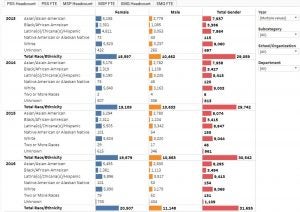Folks across UCLA are often curious about the various policies and procedures that, for instance, prohibit discrimination or otherwise regulate the conduct of UCLA students, staff, or faculty. Here are a few UC and UCLA policies relevant to equity, diversity, and inclusion.
➡ For more information on UC policies and codes of conduct, as well as state and federal laws related to Title IX, please visit: http://www.sexualviolence.ucla.edu/Policies.
Here’s a quick reference list of (some of) the policies and procedures featured below:
Procedures:
- DPO & Title IX Office Investigation “Procedures” (PHADHOR) (version 3.1 | released 2019 08 08)
- UCLA Policy 240 (Investigating Allegations of Student Conduct that Negatively Impacts Campus Climate)
- UC Student Conduct Procedures
- Climate Assessments
Codes of Conduct:
- UC Sexual Violence and Sexual Harassment Policy
- UC Discrimination, Harassment, and Affirmative Action in the Workplace Policy
- Guidance on Abusive Conduct and Bullying in the Workplace
- Proposition 209 Primers
- Faculty Code of Conduct
- UC Academic Personnel Manual
- The UCLA CALL
Norms:
Freedom of Speech:
- UCLA’s Content Neutral Time, Place, and Manner Regs
- UCLA Policy 862 (Major Events Not Sponsored by a University Unit)
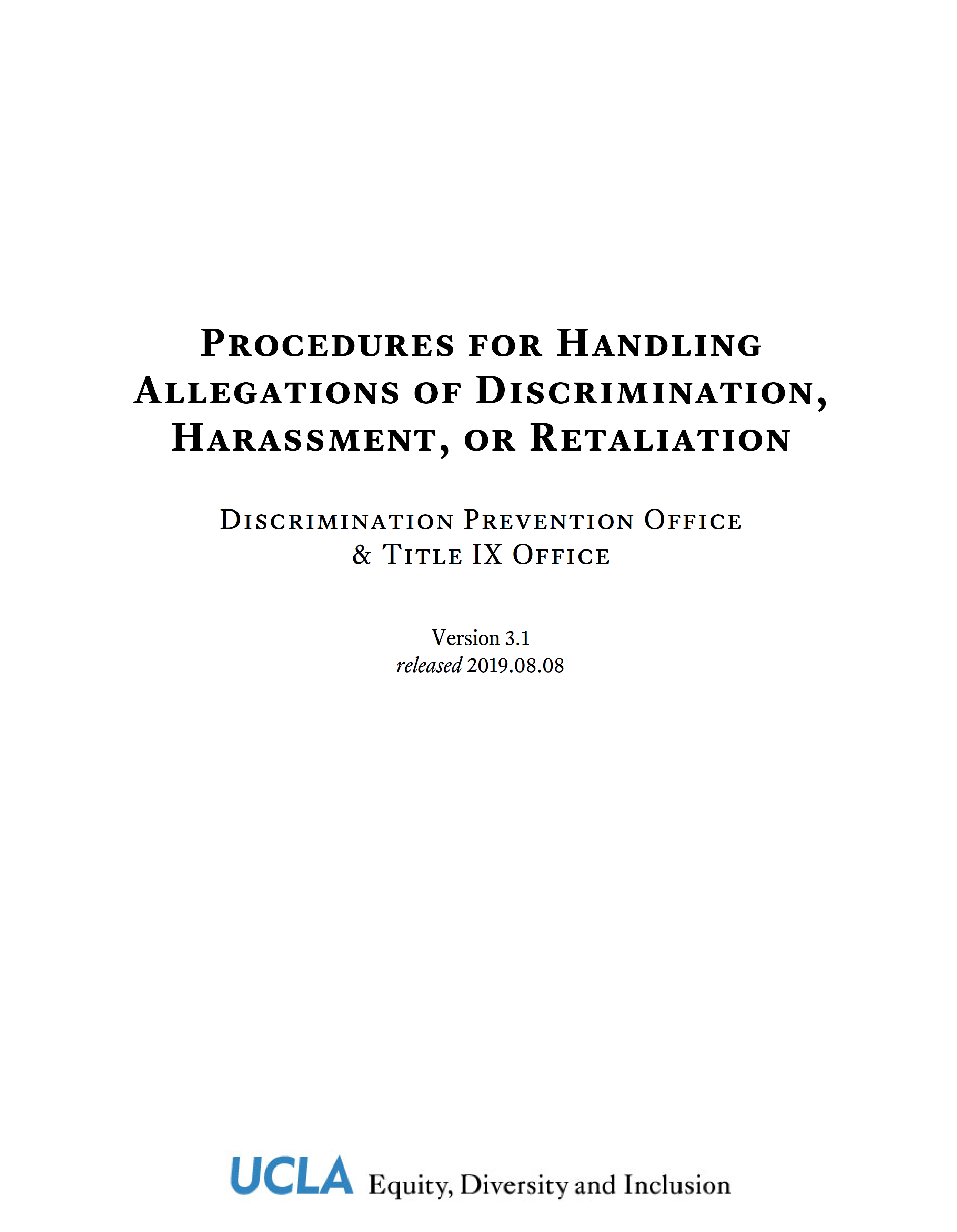
Procedures for Handling Allegations of Discrimination, Harassment, or Retaliation
On July 1, 2015, the Office of Equity, Diversity and Inclusion (EDI) was created with multiple missions, including prompt response to, and professional investigation of, reports of discrimination, harassment, and retaliation. Residing within EDI are two independent investigatory units that handle such reports: the Discrimination Prevention Office (DPO) and the Title IX (T9) Office. This document (the “Procedures” a.k.a. “PHADHOR”) describes the procedures used by the DPO in all cases and by the T9 Office when responding to allegations against non-students. <full text>
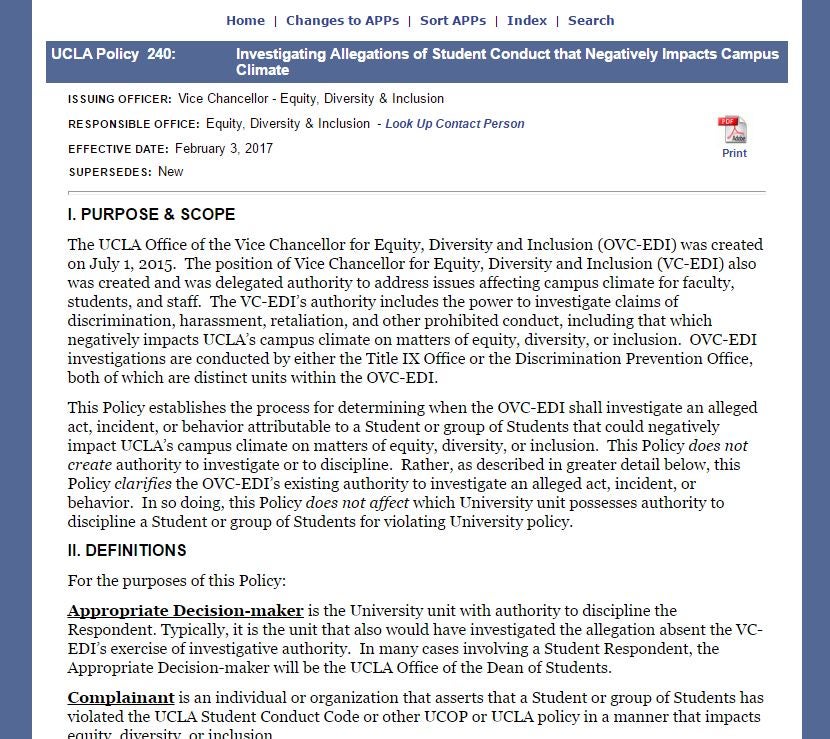
UCLA Policy 240: Investigating Allegations of Student Conduct that Negatively Impacts Campus Climate
This Policy establishes the process for determining when the OVC-EDI shall investigate an alleged act, incident, or behavior attributable to a Student or group of Students that could negatively impact UCLA’s campus climate on matters of equity, diversity, or inclusion. This Policy does not create authority to investigate or to discipline. Rather, as described in greater detail below, this Policy clarifies the OVC-EDI’s existing authority to investigate an alleged act, incident, or behavior. In so doing, this Policy does not affect which University unit possesses authority to discipline a Student or group of Students for violating University policy. View the Policy on UCLA’s APP website.
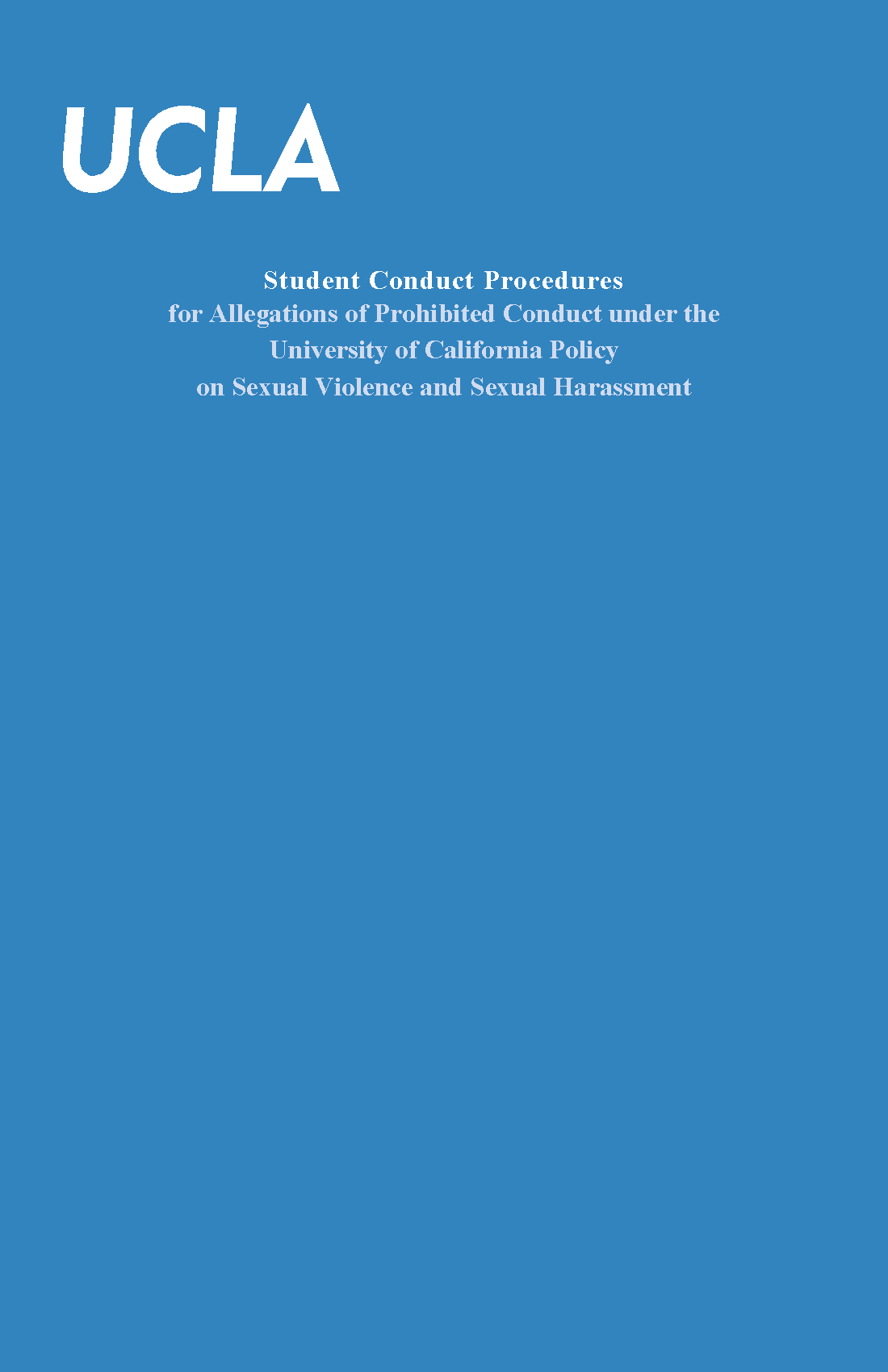
UCLA Student Conduct Procedures -- Allegations of Prohibited Conduct under UC SVSH Policy
“Students are considered to be maturing adults, capable of making their own decisions, as well as accepting the consequences for those decisions. University policies, the UCLA Conduct Code, and these Student Conduct Procedures for Prohibited Conduct under the University of California Policy on Sexual Violence and Sexual Harassment (“Procedures”) have been established to respond promptly and effectively to incidents involving allegations of sexual harassment and sexual violence within our community.” <full text>
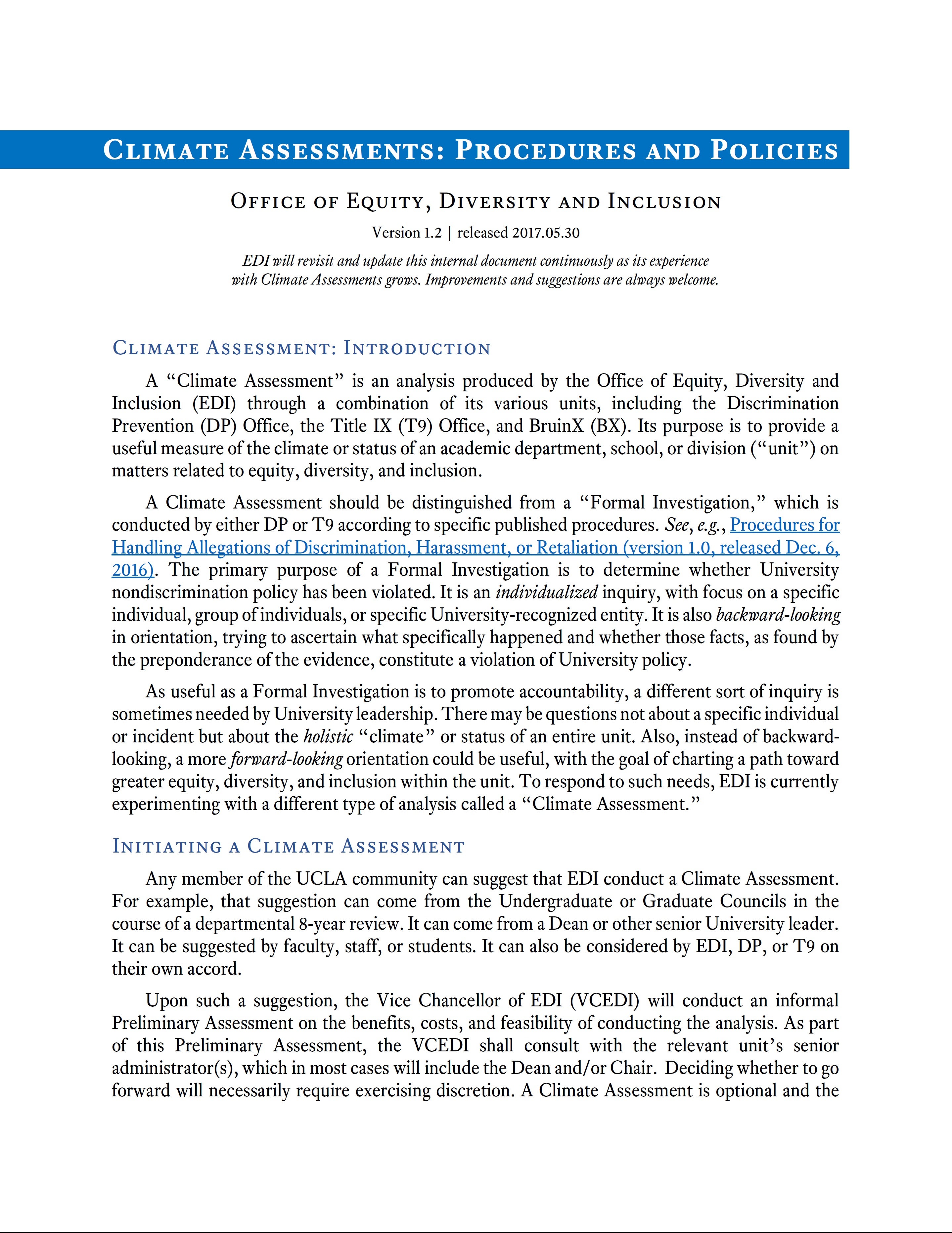
Climate Assessments: Procedures and Policies
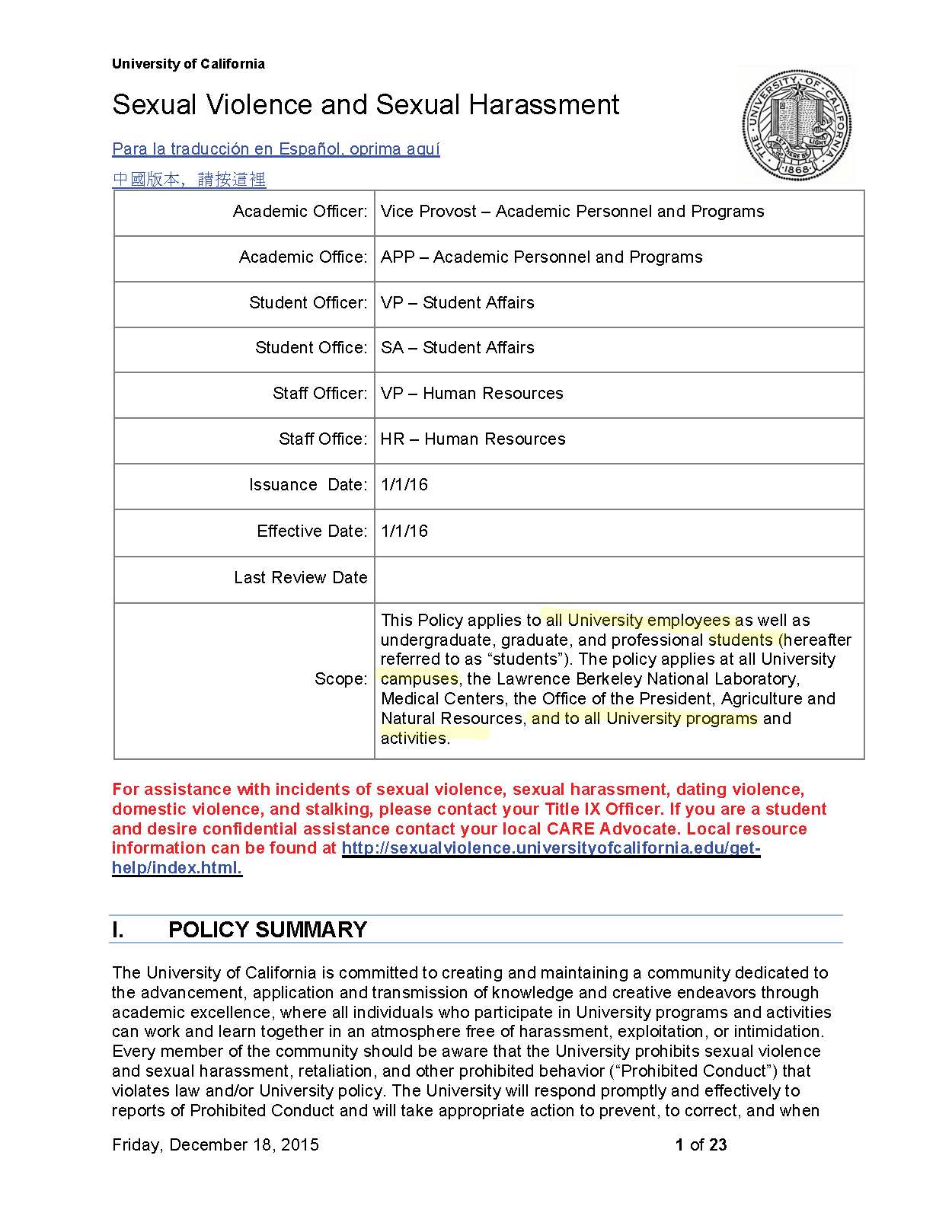
UC Sexual Violence and Sexual Harassment Policy
“The University of California is committed to creating and maintaining a community dedicated to the advancement, application and transmission of knowledge and creative endeavors through academic excellence, where all individuals who participate in University programs and activities can work and learn together in an atmosphere free of harassment, exploitation, or intimidation. Every member of the community should be aware that the University prohibits sexual violence and sexual harassment, retaliation, and other prohibited behavior (“Prohibited Conduct”) that violates law and/or University policy.” <full text>
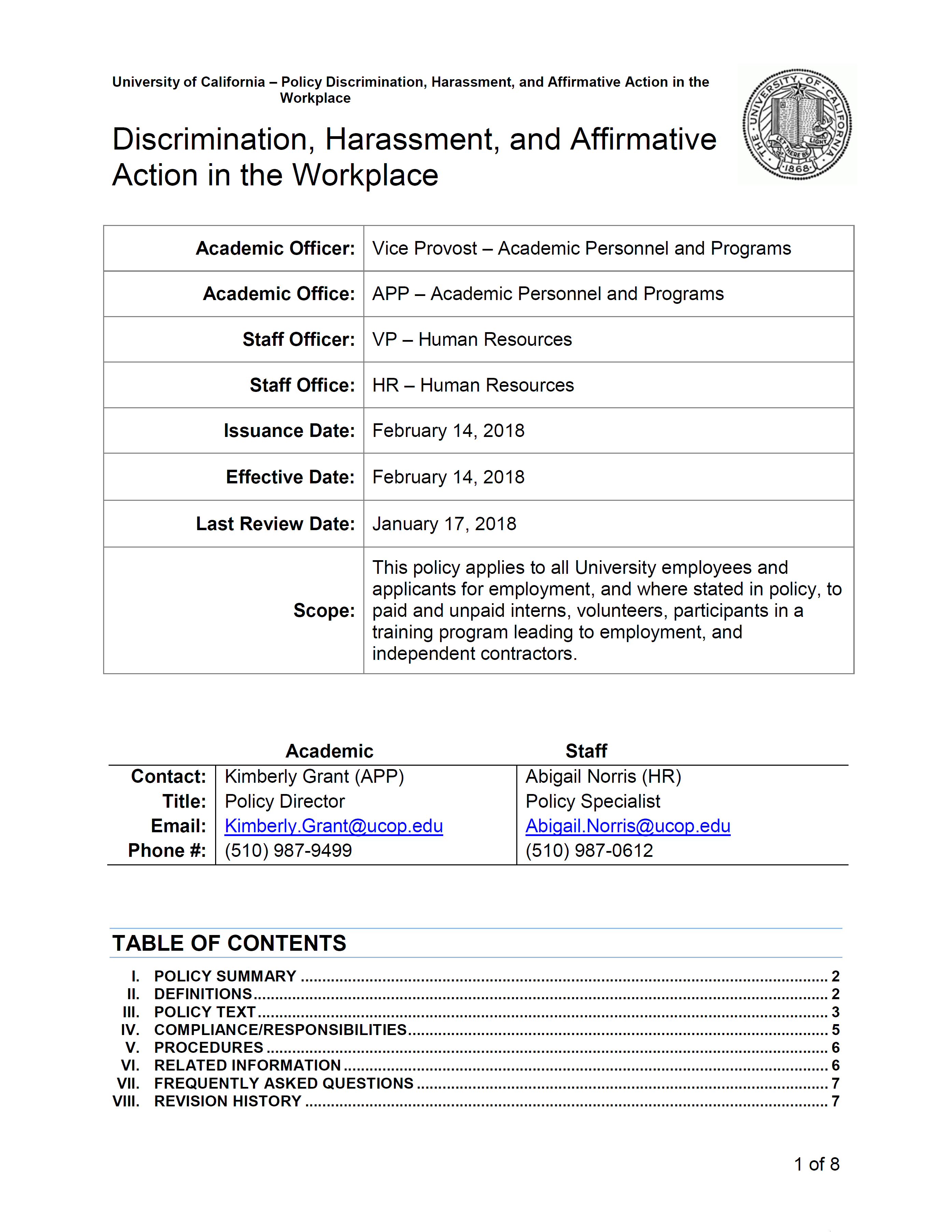
UC Discrimination, Harassment, and Affirmative Action in the Workplace Policy
“The University prohibits discrimination against any person employed; seeking employment; or applying for or engaged in a paid or unpaid internship or training program leading to employment with the University of California on the basis of race, color, national origin, religion, sex, gender, gender expression, gender identity, gender transition status, pregnancy, physical or mental disability, medical condition (cancer-related or genetic characteristics), genetic information (including family medical history), ancestry, marital status, age, sexual orientation, citizenship, or service in the uniformed services, including protected veterans.” Scope: This policy applies to all University applicants and employees <full text>
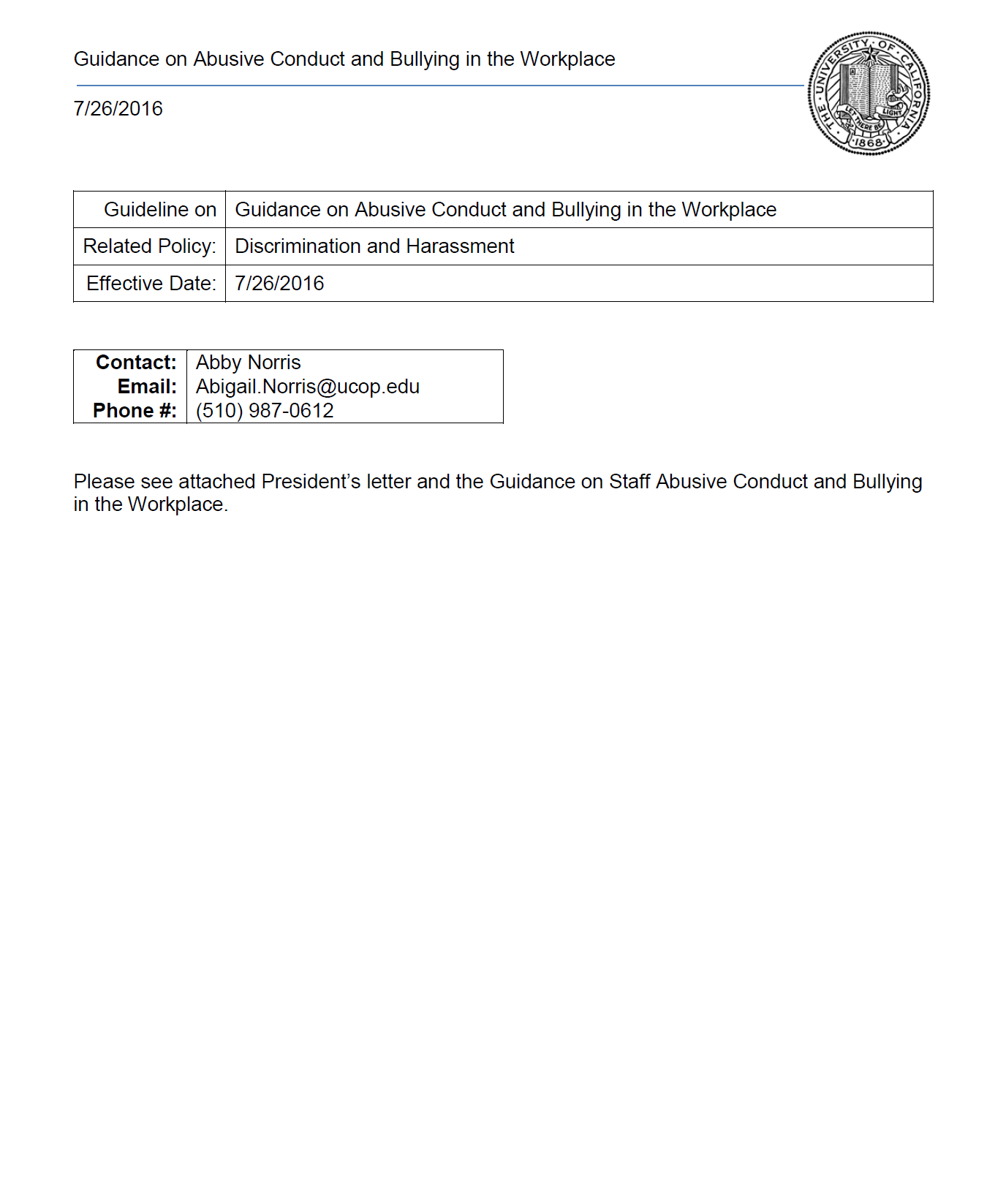
Guidance on Abusive Conduct and Bullying in the Workplace
“The University of California is committed to providing a safe, supportive, responsive and equitable environment for all employees. The University strives to be a leader as an employer and to foster a positive working environment.
In furtherance of these goals and the University’s anti-harassment and anti-discrimination policies, all UC community members are expected to behave in ways that support UC’s Principles of Community and Regents Policy 1111 (Statement of Ethical Values and Standards of Ethical Conduct), which states that UC is committed to treating each member of the University community with respect and dignity. Abusive conduct and bullying behaviors are inconsistent with the values of the University and should be addressed directly and comprehensively. The University does not tolerate abusive conduct or bullying. Regardless of circumstances or setting, staff at all levels found to be engaging in abusive conduct should be held accountable. No member of the University community will be retaliated against for reporting bullying in good faith. While UC has a number of current policies that could be used to address bullying, there is some confusion among employees about what bullying is and how to address it.” <full text>

Proposition 209 Primers
Proposition 209 prohibits the University from “discriminat[ing] against” or “grant[ing] preferential treatment to” any individual or group on the basis of race, sex, color, ethnicity, or national origin. The following two UC documents offer a thorough review of Proposition 209 and its impact:
- Guidelines for Enhancing Diversity at UC in the Context of Proposition 209
- Guidelines for Addressing Race and Gender Equity in Academic Programs in Compliance with Proposition 209
For a review of six key takeaways, please refer to the Office of Equity, Diversity and Inclusion Proposition 209 Primer.
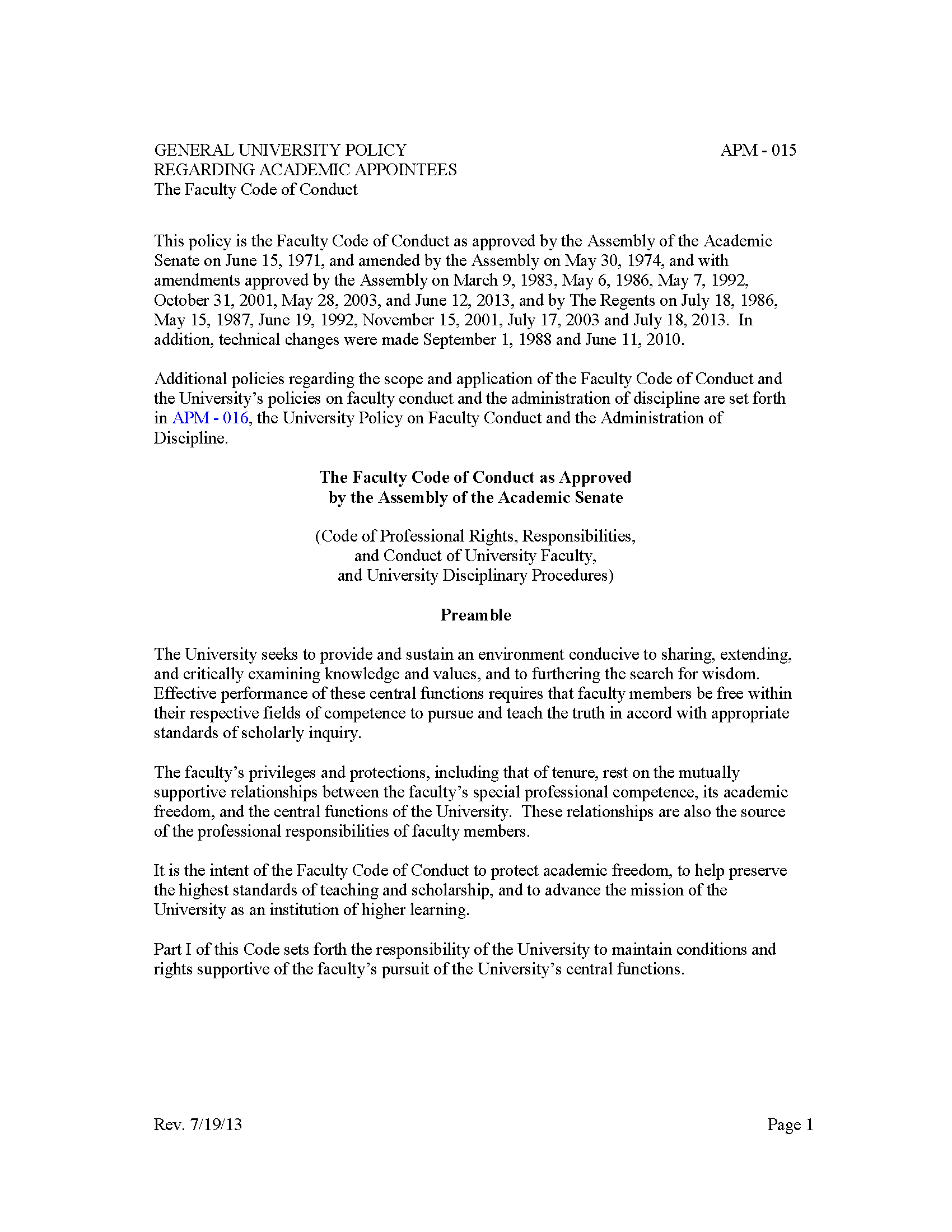
Faculty Code of Conduct
Prohibiting, among other things, “[d]iscrimination, including harassment, against University employees on political grounds, or for reasons of race, color, religion, sex, sexual orientation, gender, gender expression, gender identity, ethnic origin, national origin, ancestry, marital status, pregnancy, physical or mental disability medical condition (cancer-related or genetic characteristics), genetic information (including family medical history), or service in the uniformed services as defined by the Uniformed Services Employment and Reemployment Rights Act of 1994 (USERRA), as well as state military and naval service, or, within the limits imposed by law or University regulations, because of age or citizenship or for other arbitrary or personal reasons.” <full text>
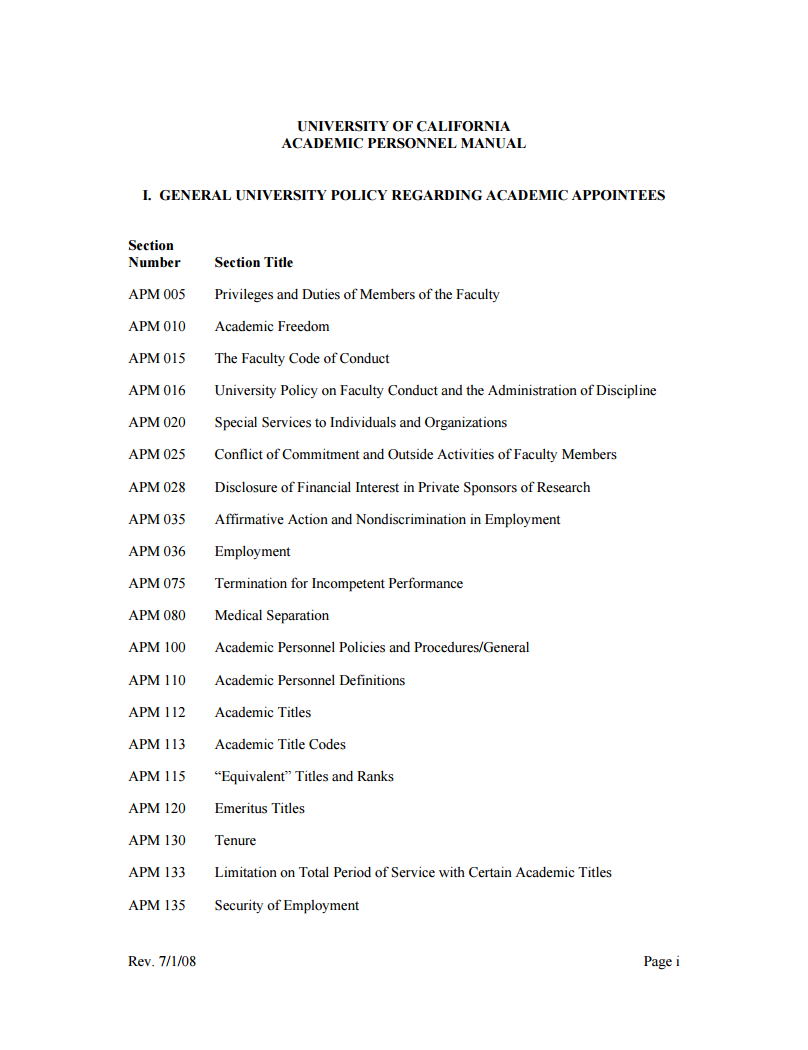
UC Academic Personnel Manual
“Academic Personnel and Programs develops, implements and manages policies and procedures pertaining to the employment relationship between an academic appointee and the University of California. These policies and procedures are issued by the Provost and Executive Vice President of Academic Affairs and published in the Academic Personnel Manual (APM). The Policy Development Process is designed to insure that APM policies undergo comprehensive review and meet certain standards. Academic appointees subject to policies and procedures within the APM include, but are not limited to, faculty such as Professorial Rank Faculty, Lecturers and Clinical Faculty; academic research professionals such as Professional Researchers and Specialists; academic service professionals such as Librarians and Cooperative Extension Specialists and Advisors; and graduate student employees such as Research and Teaching Assistants.” <full text>
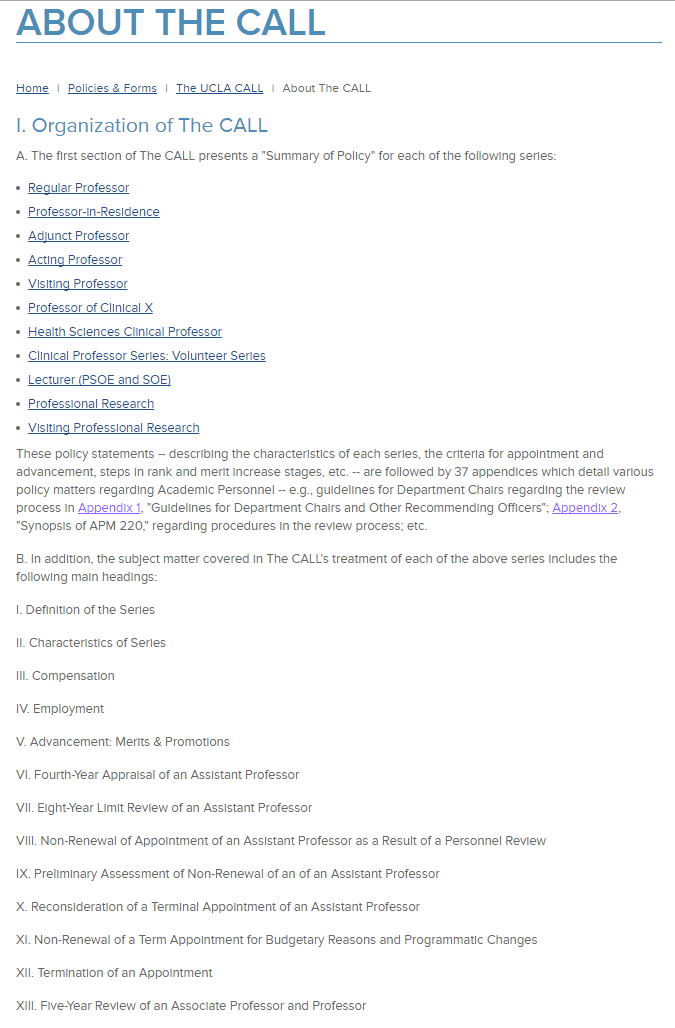
The UCLA CALL
The CALL provides further information of Professional, Lecturer, and Professional Research Series policies at UCLA. “These policy statements — describing the characteristics of each series, the criteria for appointment and advancement, steps in rank and merit increase stages, etc. — are followed by 37 appendices which detail various policy matters regarding Academic Personnel — e.g., guidelines for Department Chairs regarding the review process in Appendix 1, “Guidelines for Department Chairs and Other Recommending Officers”; Appendix 2, “Synopsis of APM 220,” regarding procedures in the review process; etc.” <full text>
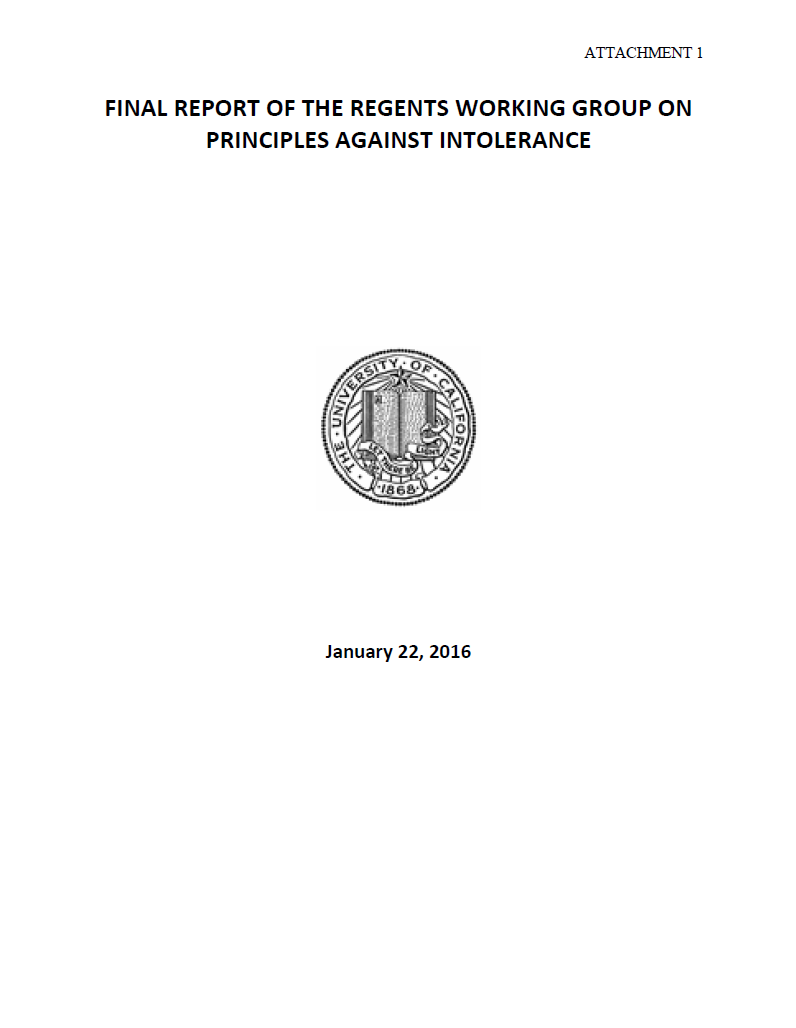
Principles Against Intolerance
The “Principles Against Intolerance” reaffirm the university’s long-standing view that “[a]cts of hatred and other intolerant conduct, as well as acts of discrimination that demean our differences, are antithetical to the values of the University and serve to undermine its purpose.” The Regents also recognize that “[f]reedom of expression and freedom of inquiry are paramount” and the “University will vigorously defend the principles of the First Amendment.” ➡ VC Kang’s CrossCheck about the Principles Against Intolerance
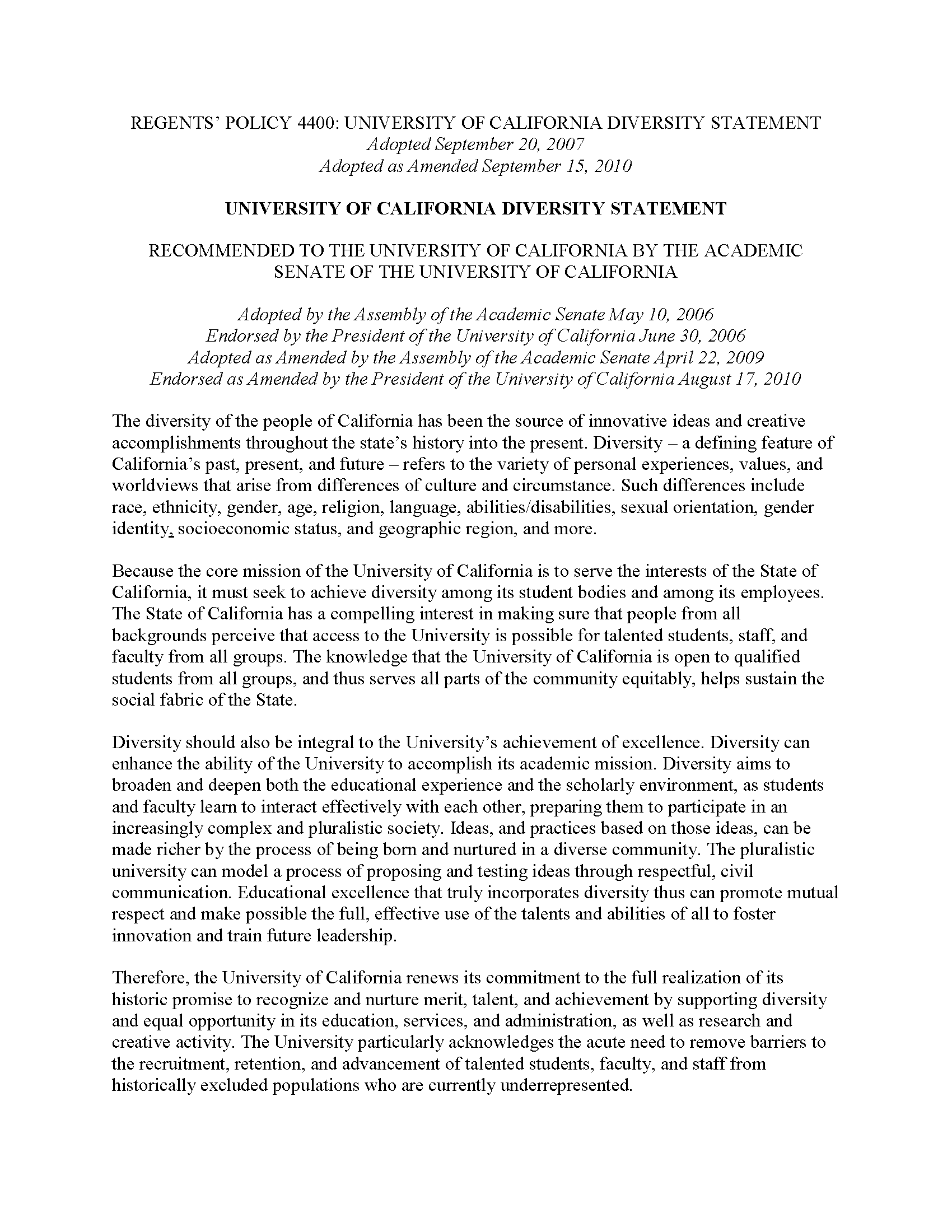
UC Diversity Statement
“Because the core mission of the University of California is to serve the interests of the State of California, it must seek to achieve diversity among its student bodies and among its employees. The State of California has a compelling interest in making sure that people from all backgrounds perceive that access to the University is possible for talented students, staff, and faculty from all groups. The knowledge that the University of California is open to qualified students from all groups, and thus serves all parts of the community equitably, helps sustain the social fabric of the State.” <full text>
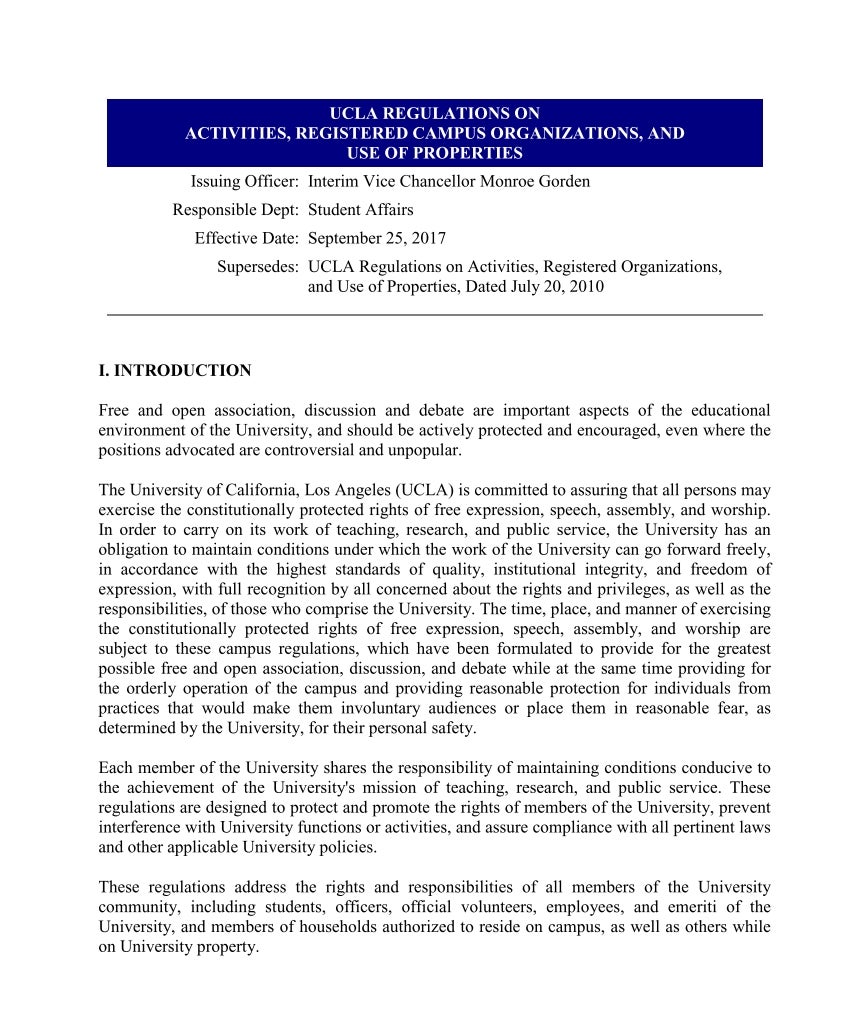
UCLA Content Neutral Time, Place and Manner Regulations (2017.09.25)
“The University of California, Los Angeles (UCLA) is committed to assuring that all persons may exercise the constitutionally protected rights of free expression, speech, assembly, and worship. In order to carry on its work of teaching, research, and public service, the University has an obligation to maintain conditions under which the work of the University can go forward freely, in accordance with the highest standards of quality, institutional integrity, and freedom of expression, with full recognition by all concerned of the rights and privileges, as well as the responsibilities, of those who comprise the University. The time, place, and manner of exercising the constitutionally protected rights of free expression, speech, assembly, and worship are subject to these campus regulations, which have been formulated to provide for the greatest possible free and open association, discussion, and debate while at the same time providing for the orderly operation of the campus and providing reasonable protection for individuals from practices that would make them involuntary audiences or place them in reasonable fear, as determined by the University, for their personal safety.” <full text>
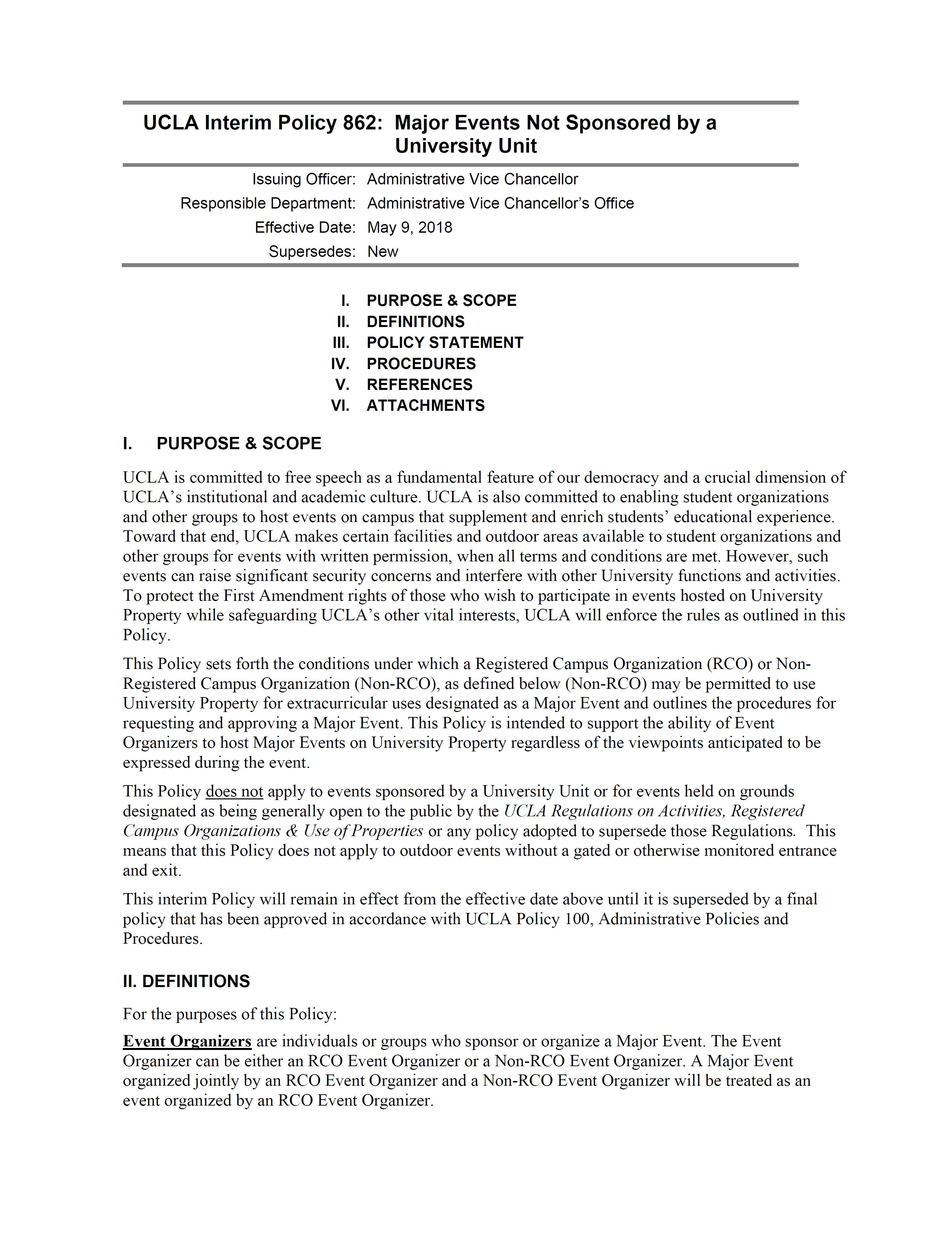
UCLA Policy 862 : Major Events Not Sponsored by a University Unit
“UCLA is committed to free speech as a fundamental feature of our democracy and a crucial dimension of UCLA’s institutional and academic culture. UCLA is also committed to enabling student organizations and other groups to host events on campus that supplement and enrich students’ educational experience. Toward that end, UCLA makes certain facilities and outdoor areas available to student organizations and other groups for events with written permission, when all terms and conditions are met. However, such events can raise significant security concerns and interfere with other University functions and activities. To protect the First Amendment rights of those who wish to participate in events hosted on University Property while safeguarding UCLA’s other vital interests, UCLA will enforce the rules as outlined in this Policy.” <full text>


